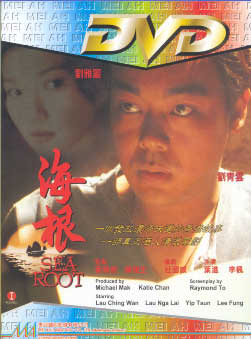Sea Root

Reviewed by YTSL
It was Brian who mentioned a while back to me
that the world of Hong Kong movies can be like a web, full of connections
and also with various strands leading one off to explore it in diverse directions.
I have found his statement to be very true, and reveled in my appreciation
of one particular gem often bringing about (further) "discoveries" re other
efforts by individual talents who I have come to respect and admire.
A case in point: My love for "Peking Opera Blues" inspired me to check
out a host of other films which not only star Brigitte Lin, bear the imprint
of Tsui Hark, contain action sequences choreographed by Ching Siu Tung and
are shot by Poon Hang Sang but also productions whose scripts were written
by Raymond To (e.g., "Hu-Du-Men" and also this quiet drama which was given
a prime Christmas period release slot in 1995 and ended up spending a lengthy
54 days on Hong Kong cinema screens).
SEA ROOT's title refers to the film's fisherman
protagonist (Root is portrayed by the versatile Lau Ching Wan). It also
well describes the character's ties with the sea, the strength of whose attachments
can be seen in: Him and his parents (who are played by Yip Chun and
Lee Fung) opting to live -- not just work -- on boats (rather than land);
along with the reticent man's tendency, for much of his life, to look to
the sea rather than to people for comfort and solace as well as companionship.
Frankly, it was a definite plus for me that this offering unconventionally
focused on the kind of folk whose milieu of choice is a far cry from those
of such as the Triad Boyz and consumerist yuppies who pepper many a Hong
Kong movie (something which is well illustrated by Root's being revealed
to not know what or where Mongkok is as well as not realizing how much he
stuck out like a sore thumb when walking leisurely and eating an ice cream
cone on a Tsim Sha Tsui main street).

With an opening sequence which utilizes genuinely old TV shows to communicate
the thoughts of its scriptwriter directly to the audience, I can see how
people could initially reckon that SEA ROOT is a paean to the good ol' days
and ways. Do not be misled though into thinking that this seriously
unflashy production -- which relies on small items and actions (e.g., the
discovery of what happens to certain laboriously written letters, the burning
of a small wooden box) to successfully trigger powerful flashes of emotions
-- is one which emphasizes past events over present (and future) occurrences.
In fact, even while it does seem to possess a nostalgic feel and contains
its share of "flashback" segments (to more innocent and prosperous days),
the film's makers turn out to be clearly asserting that it is not ideal to
wallow in memories and live in the past, especially at the expense of coming
to grips with contemporary realities and grasping opportunities that can
make the future a happier time than now.

The consistent transmission of this main theme in SEA ROOT is a bit surprising
when it is realized that the offering was helmed by as many as five directors
(who are collectively credited as the Art Concept Creative Group).
Alternatively, different visual styles and tonal "feels" can be discerned
in different sections of this work. I particularly feel this with regards
to the way the film ends (Even after giving it quite a bit of thought, I
still can't figure out whether it was a dream or "real" sequence...).
The early portion in the movie when Root and his cousin go to a Mainland
Chinese village to "buy" a girl (to help out Root's disabled mother with
her chores; an act which no one seems to have moral qualms about) also seems
to not too seamlessly fit with the others.

Actually, this (re)viewer might go so far as to suggest that the one major
discordant -- even false -- note that reverberates throughout SEA ROOT comes
by way of its not uncharming principal female character (and lead actress).
Others might think differently but: While I can definitely accept that
a rural Mainland Chinese lass can idolize Anita Mui the way that "He's a
Woman, She's a Man"'s Wing did Rose, I found it difficult to believe that
someone who had previously never ventured out of her home area could be that
streetwise -- and not just that eminently knowledgeable about Hong Kong's
geography -- as Alice Lau's sparkly Lotus character. It also didn't
help matters that Ms. Lau -- at least in this offering -- has an air about
her that makes it seem very unlikely that she would and could have led the
life of the admittedly untraditional woman she was asked to portray in this
movie.

Apart from that which arose from this one piece of miscasting though, the
makers of SEA ROOT really ought to be commended for having made -- plot and
all -- an authentic feeling as well as moving "slice of life" film that helps
show the socio-cultural diversity of Hong Kong's populace. It was novel
and interesting too to get the alternative views of Ocean Park, Aberdeen
and other areas of the former British Crown Colony that one is given in this
movie. At the risk of sounding facetious, I have to state that it also
was refreshing to see a Christian priest character being portrayed by someone
other than Spencer Lam (Father Fok was played instead by Woo Fung)!
My rating for this film: 7.





